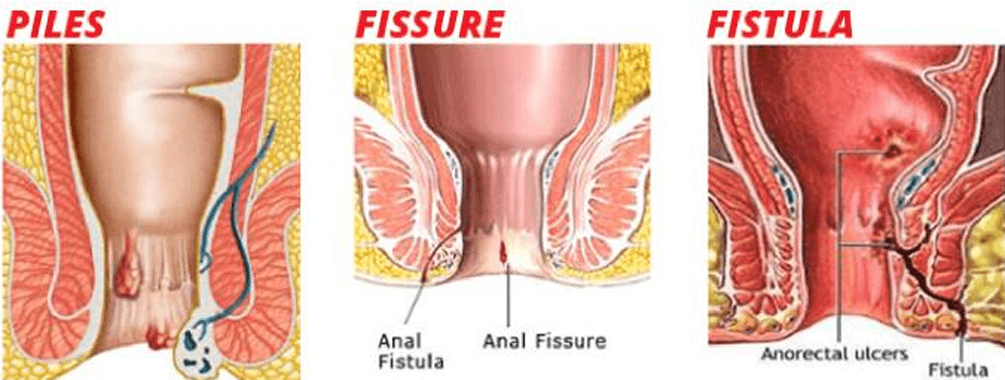Piles/ Fistula/ Hydrocele/ Lord's
Overview
- Piles (Hemorrhoids): Piles refer to swollen and inflamed veins in the rectum and anus. Common symptoms include pain, bleeding during bowel movements, and discomfort. Treatment options range from lifestyle changes and medications to minimally invasive procedures or surgery in severe cases
- Fistula: An anal fistula is an abnormal connection or tunnel between the anal canal and the skin near the anus. It often results from an abscess that has drained. Treatment may involve surgical intervention to close the fistula and prevent recurrence.
- Hydrocele: A hydrocele is a fluid-filled sac around the testicle. It can cause swelling and discomfort. Treatment options include observation, aspiration of the fluid, or surgical intervention to repair the underlying cause and prevent fluid accumulation.
- Lord’s (Lords Procedure): The Lord’s procedure, also known as Lord’s anal repair, is a surgical procedure used to treat certain types of anal fissures. It involves a small incision in the internal anal sphincter to reduce muscle tension and promote healing.

Why it's done
Piles/ Fistula/ Hydrocele/ Lord’s may be recommended for several reasons, including:
Piles (Hemorrhoids) Treatment:
- Relief of Symptoms: Treatment aims to alleviate symptoms associated with hemorrhoids, such as pain, bleeding, itching, and discomfort during bowel movements.
- Prevention of Complications: Addressing hemorrhoids helps prevent complications such as thrombosis (blood clot formation) and prolapse.
Fistula Treatment:
- Resolution of Infection: Fistulas often result from an abscess. Treatment involves drainage of the abscess and removal of the fistula to resolve the infection.
- Prevention of Recurrence: Surgical intervention aims to prevent recurrent abscesses and infections associated with the fistula.
Hydrocele Treatment:
- Relief of Symptoms: Surgical intervention is performed to reduce scrotal swelling and alleviate discomfort associated with a hydrocele.
- Prevention of Recurrence: Hydrocelectomy aims to prevent the reaccumulation of fluid and recurrence of the hydrocele.
Lord’s (Lords Procedure) Treatment:
- Healing of Chronic Anal Fissures: The Lord’s procedure involves making an incision in the internal anal sphincter to reduce muscle tension, allowing chronic anal fissures to heal.
- Relief of Pain: By reducing muscle tension, this procedure aims to relieve pain associated with chronic anal fissures.
Risk
Piles/ Fistula/ Hydrocele/ Lord’s treatment, can pose potential risks and complications. Some of these include:
- Bleeding
- Infection
- Discomfort
- Recurrence
- Anal Incontinence
- Sphincter Injury
How do I get ready for Piles/ Fistula/ Hydrocele/ Lord's treatment?
Preparing for Piles/ Fistula/ Hydrocele/ Lord’s treatment involves several steps to ensure a smooth procedure and recovery:
Piles (Hemorrhoids) Treatment:
- Preparation:
- Dietary Adjustments: Increase fiber intake and stay hydrated to soften stools and reduce straining during bowel movements.
- Medication Review: Discuss with your healthcare provider if any adjustments to current medications are necessary.
- Knowledge: Understand the procedure recommended (e.g., rubber band ligation, sclerotherapy) and potential side effects.
- Preparation:
Fistula Treatment:
- Preparation:
- Hygiene Practices: Maintain good anal hygiene to minimize the risk of infection.
- Medication Review: Discuss current medications with your healthcare provider.
- Understanding the Procedure: Familiarize yourself with the planned surgical intervention and its expected outcomes.
- Preparation:
Hydrocele Treatment:
- Preparation:
- Fasting Instructions: If surgery is planned, follow any fasting instructions provided by your healthcare team.
- Hygiene Practices: Maintain overall hygiene to minimize infection risks.
- Clothing: Wear loose and comfortable clothing on the day of the procedure.
- Preparation:
Lord’s (Lords Procedure) Treatment:
- Preparation:
- Understanding the Procedure: Learn about the Lord’s procedure, including its purpose and potential outcomes.
- Dietary Adjustments: Follow any dietary guidelines provided by your healthcare team.
- Medication Review: Discuss any medications you are currently taking with your healthcare provider.
- Preparation:
General Preparations for All Treatments:
- Arrange Transportation: Plan for someone to drive you to and from the medical facility on the day of the procedure.
- Support System: Have a support system in place, such as a friend or family member who can assist you during the recovery period.
- Postoperative Care Planning: Discuss postoperative care instructions, including pain management, activity restrictions, and follow-up appointments.


